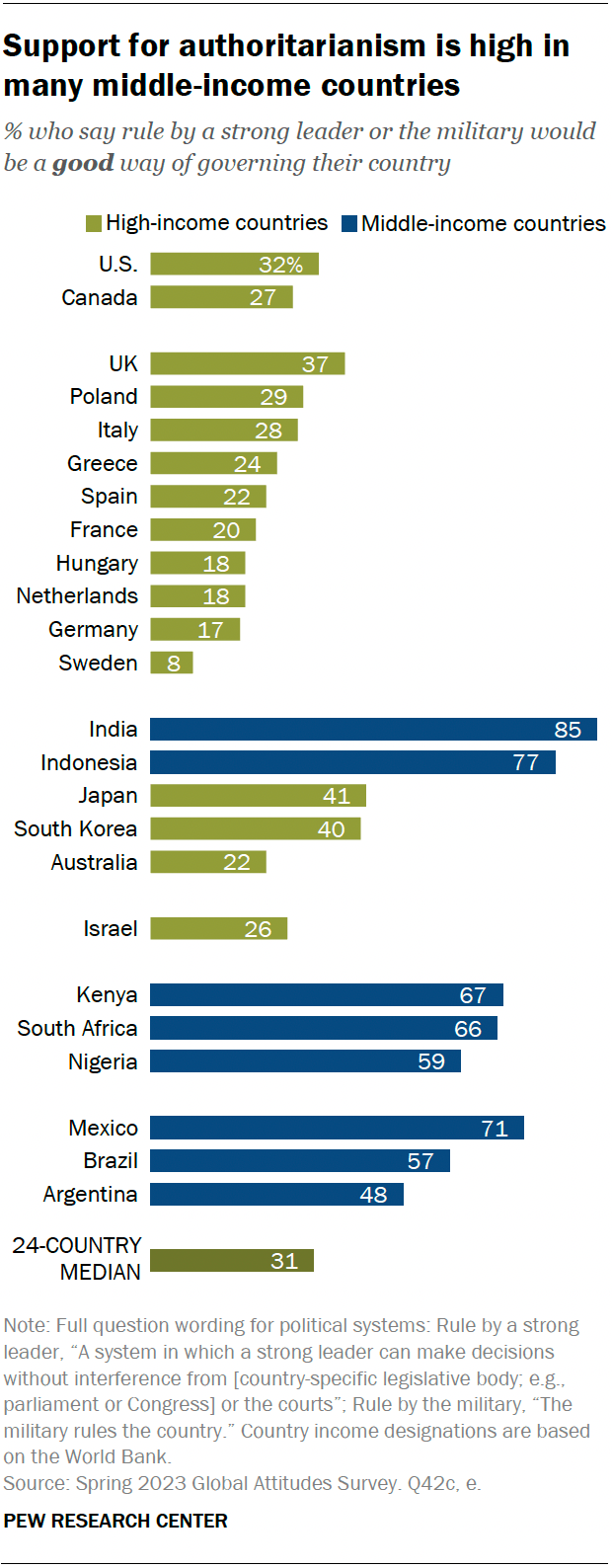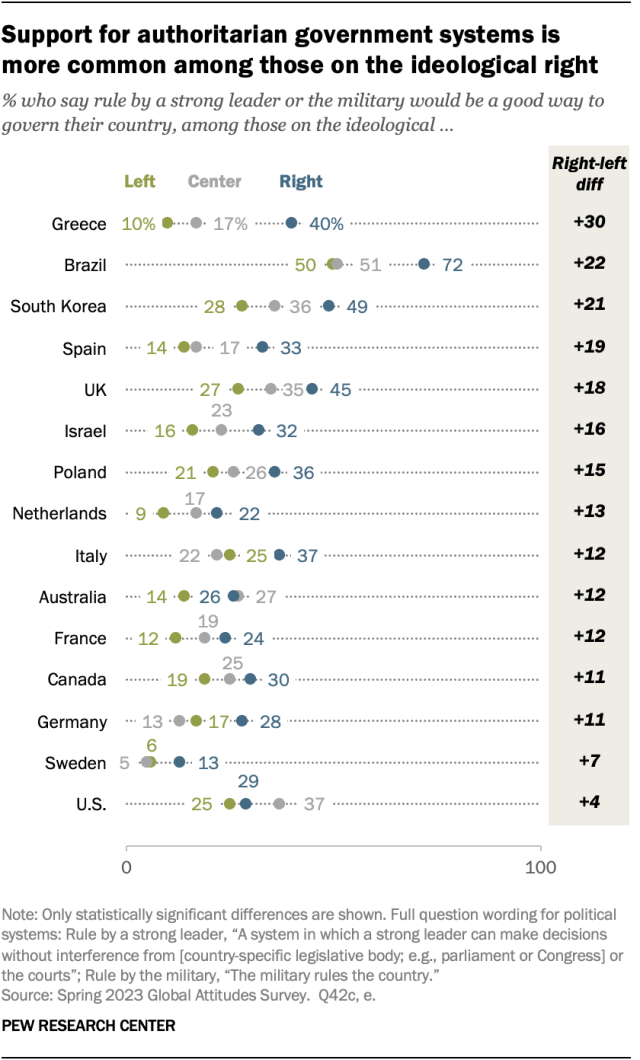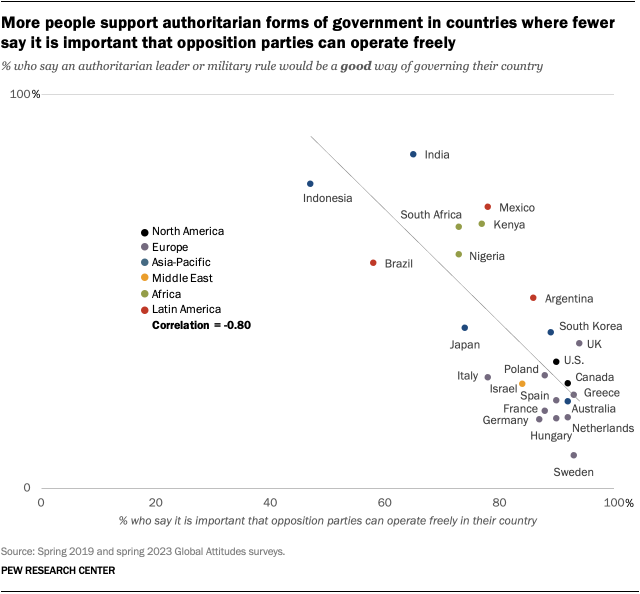While most people see representative democracy as a good way to govern their country, large shares of the public in many countries are open to nondemocratic alternatives.
This Pew Research Center analysis on views of authoritarianism uses data from nationally representative surveys conducted in 24 countries across North America, Europe, the Middle East, the Asia-Pacific region, sub-Saharan Africa and Latin America. All responses are weighted to be representative of the adult population in each country.
For non-U.S. data, this analysis draws on nationally representative surveys of 27,285 adults conducted from Feb. 20 to May 22, 2023. All surveys were conducted over the phone with adults in Canada, France, Germany, Greece, Italy, Japan, the Netherlands, South Korea, Spain, Sweden and the United Kingdom. Surveys were conducted face-to-face with adults in Argentina, Brazil, Hungary, India, Indonesia, Israel, Kenya, Mexico, Nigeria, Poland and South Africa. In Australia, we used a mixed-mode probability-based online panel. Read more about international survey methodology.
In the U.S., we surveyed 3,576 adults from March 20 to 26, 2023. Everyone who took part in this survey is a member of the Center’s American Trends Panel (ATP), an online survey panel that is recruited through national, random sampling of residential addresses. This way, nearly all U.S. adults have a chance of selection. The survey is weighted to be representative of the U.S. adult population by gender, race, ethnicity, partisan affiliation, education and other categories. Read more about the ATP’s methodology.
We measure support for authoritarianism by looking at the share who said at least one of the following systems of government would be a good way of governing their country:
- A system in which a strong leader can make decisions without interference from parliament or the courts (“authoritarian leader”)
- A system in which the military rules the country (“military rule”)
We also draw upon the results of an open-ended question: “What do you think would help improve the way democracy in our country is working?” Researchers examined random samples of English responses, machine-translated non-English responses and responses translated by a professional translation firm to develop a codebook for the main topics mentioned across the 24 countries.
In this analysis, we focus on only two of these final codes: support for nondemocratic alternatives (coded in “Other” in the primary analysis) and change leadership. A forthcoming report will share more details on the coding process and the many other solutions people offered.

Indeed, a median of 31% across 24 nations are supportive of authoritarian systems, according to a recent Pew Research Center survey. The survey asked about two authoritarian models of government: a system in which a strong leader can make decisions without interference from parliament or the courts (“authoritarian leader”) and a system in which the military rules the country (“military rule”).
The share of the public that supports at least one of these models ranges from 85% in India to 8% in Sweden. It tends to be higher in middle-income countries than high-income countries. It also tends to be higher in surveyed countries in the Asia-Pacific region, Africa or Latin America than in Europe and North America.
Who supports authoritarian systems?
In most of the 18 countries where we asked about ideology, people on the ideological right are more likely than those in the center or on the left to support authoritarian systems. For example, South Koreans on the right (49%) are nearly twice as likely as those on the left (28%) to support authoritarian systems. Meanwhile, 36% of centrists in South Korea support such systems.

Across Europe, people who have favorable views of right-wing populist parties are also especially likely to support authoritarianism. In Germany, for example, 37% of those who have a favorable view of the Alternative for Germany party (AfD) support these nondemocratic ways of governing, compared with 13% who have an unfavorable view of the AfD.
People with lower incomes also tend to be more supportive of authoritarian systems than those with higher incomes. This relationship exists in both high-income and middle-income countries (as defined by the World Bank). For example, 47% of those with incomes below the median in the United Kingdom support authoritarian systems, compared with 27% of those with incomes at or above the median.
In a few countries, older and younger adults differ in their support for authoritarian systems. For example, 38% of Americans under age 30 support these nondemocratic alternatives, compared with 29% of those ages 50 to 64 and 26% of those 65 and older. In India and Australia, the pattern is similar. But in Greece, Japan and South Korea, older adults are more supportive of authoritarian systems than younger ones.
How does support for authoritarian systems relate to views of democracy?
A 2019 Center survey asked respondents to rate the importance of democratic values including a fair judiciary system, gender equality, regular elections, free speech, press freedom, freedom on the internet, and the ability for human rights organizations and opposition parties to operate freely. Across each of these dimensions, countries with smaller shares of people who say these values are important in their country have higher numbers who support rule by a strong leader or the military.

For example, in countries where fewer people say it is important that opposition parties can operate freely, there is more support for authoritarian systems of government. Indonesia displays this relationship well. Indonesians are the least likely of the 24 countries surveyed in 2023 to see free opposition parties as important in their country (47%). They are also among the most supportive of authoritarian systems (77%).
On the other end of the scale, Swedes have one of the highest shares saying free opposition parties are important (93%) but the lowest share who support rule by a strong leader or the military (8%).
Across the surveyed countries, there is a similarly strong negative relationship between authoritarianism and the other democratic values.
What do those who support authoritarian systems think would fix their democracy?
We also asked an open-ended question about what would help improve the way democracy in their country is working. Notably, despite the relatively high support in some places for nondemocratic options, few people suggest overturning their system and replacing it with a nondemocratic alternative. Only in Greece, Israel and Spain did 1% volunteer this as their solution.
Among the small subset of respondents who did call for replacing their democracy with another system, the new system they would install varies:
- Military rule: “Declare martial law and let the military take control.” – Man, 68, Greece
- Expert rule: “By having experts on democracy to guide us who are not interested in politics.” – Woman, 30, Kenya
- Autocracy: “Completely change the system to one where a strong leader rules the affairs here and is not subordinate to courts that were not elected nor represent the people.” – Man, 41, Israel
- Theocracy: “It must be replaced by a theocracy. People should first live according to godly standards and love their neighbors, then you get a good society. Democracy, after all, is standing up for one’s own interests.” – Man, 63, Netherlands
- Anarchy: “A society should be built that does not need a leader.” – Man, 28, India
- Revolution: “It would take a coup d’etat. After peace we need war, after war there will be reconstruction. We need to reset all privileges and start over in full respect of people.” – Man, 63, Italy
Still, those who support authoritarian systems and those who do not differ on which solutions they think will help fix their democracy.
First, supporters of authoritarianism are much less likely than nonsupporters to offer any solution or idea in about half the countries polled.
Second, in some countries, those who support authoritarian systems are more likely than nonsupporters to mention economic issues. For example, two people who support authoritarian systems in the UK and Australia both focused on personal economic struggles and nonresponsive politicians:
- “They need to listen to the working class and the poorer classes. They should not think about profit first and instead focus more on homeless people and the veterans. We should use the money we pay in taxes for the NHS and emergency services and do more for families – affordable resources for child care, more affordable housing …” – Woman, 31, UK
- “If the government actually took notice of how most people in Australia are having to live on limited savings. People living on pensions are struggling to even eat due to the low payments. People on pensions, especially disability pensions, are struggling to make ends meet. Most are living under the poverty line but the government just ignores this.” – Woman, 50, Australia
Third, in Brazil and Kenya, those who support authoritarian systems of government are more likely than nonsupporters to suggest a total change of leadership. In Brazil, for example, authoritarian-system supporters are about twice as likely as nonsupporters to want to replace President Luiz Inácio Lula da Silva or other governing officials in Brazil.
People expressed such sentiments as “Get President Lula and his gang out of power” and “Change current governors and start all over again.”
The opposite is true in Israel, though: Those who do not support authoritarian systems are more likely to call for leadership changes. (The survey was conducted during a wave of protests against judicial reform and prior to the Oct. 7 Hamas attack.)
These nonsupporters argued that democracy in Israel would be improved if they “prevented Bibi Netanyahu, who has been accused of crimes, from being elected as prime minister or to any other public position” or by “Removing the dictator Netanyahu from his seat.”

